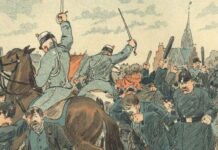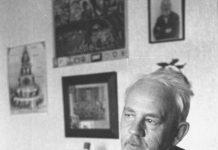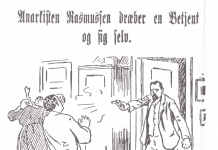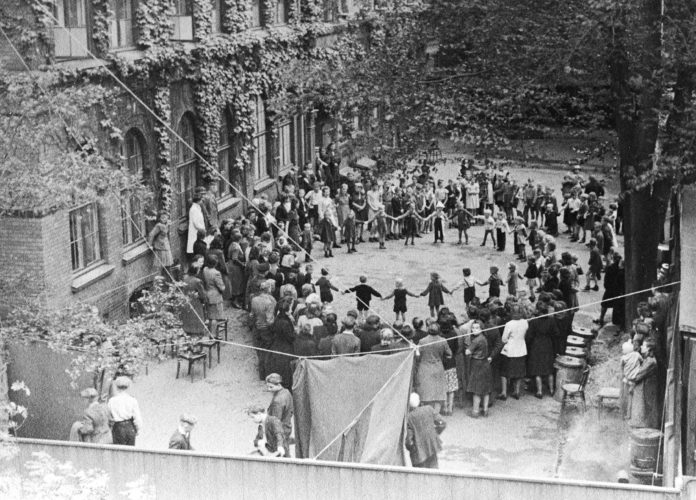
Socialistisk Biblioteks Tidslinje med links til begivenheder og personer i 1949.
Se også Index over personer, organisationer/partier og værker (som bøger, malerier, mm.), steder, begivenheder, mv., der er omtalt på hele Tidslinjen, titler og indhold på emnelisterne osv.
15. februar 1949
De sidste tyske flygtninge afrejser fra Danmark til Tyskland.
I alt ca. 268.000 ankom fra slutningen af 1944 (ca. 5% af befolkningen).
Links:
- Flygtningelejre i Danmark 1944-1949 (Wikipedia.dk). Med link til de forskellige lejre.
- Vestre Kirkegård – Tyske flygtningegrave (Tanker-i-gang.dk)
- Flygtningelejren i Oksbøl, 1945-49. Af John V. Jensen (Danmarkshistorien.dk)
Flygtningelejr Oksbøl (Flugtmuseum.dk)
I vestjyske Oksbøl vil man lave et flygtningemuseum for de 250.000 tyske flygtninge, der befandt sig her og andre steder i Danmark efter Anden Verdenskrig.
Borgerskabets forbrydelser: Da borgerskabet lod 17.000 flygtninge dø i danske lejre. Af Markus Strufe (Revolution, 11. januar 2022). “De færreste kender til historien om de knap 250.000 tyske flygtninge, der kom til Danmark efter 2. verdenskrig, og levede under kummerlige forhold i danske flygtningelejre. 17.000 flygtninge døde i lejrene, halvdelen af dem børn, og langt størstedelen af dødsfaldene kunne være undgået.”
“Dengang det var vanskeligt at gøre det rigtige for flygtningene” (Netavisen Pio, 29. oktober 2020). Anmeldelse af Thomas Harder: De uønskede: de tyske flygtninge i Danmark 1945-1949 (Gyldendal, 2020, 483 sider). “Poul Smidt anmelder ny bog med historien om da Danmark, efter 2. verdenskrig, stod med ansvaret for at huse en kvart million tyske flygtninge.”
Efter Danmarks befrielse: Tusindvis af tyske kvinder, børn og ældre døde i danske flygtningelejre. Af Anne Sophie Thingsted og Lise Brix (Videnskab.dk, 2. juni 2020). “Der hersker uenighed om, hvorvidt den danske stat kunne have gjort mere for at forhindre, at 17.000 tyske flygtninge døde i Danmark under og efter Anden Verdenskrig.”
En voldsomhed uden sidestykke. Af Erik Ingemann Sørensen (Historie-online.dk, 29. april 2020). Anmeldelse af John V. Jensen: Tyskere på flugt (Aarhus Universitetsforlag, 2020, 100 sider) (Hele bogen online som PDF-fil på AmazonS3) (100 danmarkshistorier). Med indholdsfortegnelse, litteratur og noter online.
Arven fra Oksbøl – fortidens flygtningedebat som en flaskepost til nutiden (POW International, 9. november 2018). ” Steffen Groth peger på, hvorfor Oksbøllejren aldrig må ses som en model for nutidens eller fremtidens flygtningepolitik, men som det modsatte: en advarsel.”
Tyske flygtninge i Nordslesvig 1945-1948. Af Thomas Petersen (Historie-online.dk). Anmeldelse af Leif Hansen Nielsens bog (Historisk samfund for Sønderjylland, 2013, 432 sider)
Kan lægeløftet gradbøjes?: dødsfald blandt og lægehjælp til de tyske flygtninge i Danmark 1945 (pdf). Af Kirsten Lylloff (Historisk Tidsskrift, bind 99, hæfte 1, 1999, s.33-67). Se også Historisk Tidsskrift med Diskussion: indlæg fra Thorkild Frederiksen, Simon Riber Kristensen, Ricardt Riis og Kirsten Lylloff (2000-2007) + Else Wolsgård: En sejlivet myte (Weekendavisen, nr.11, 15. marts 2019) + Erik Ingemann Sørensen: Tyske flygtninge og danske læger i 1945 (Danmarkshistorien.dk, 3. maj 2020).
De tyske flygtninge i Danmark 1945-49 (pdf). Af Tage Kaarsted (Historie/Jyske Samlinger, Bind 17, nr.2, 1987, s.255-266) + Danmark og de tyske flygtninge 1945-1949 (pdf). Af Aage Trommer (ibid., s.267-279). Opposition ved Henrik Havreheds doktorafhandling »De tyske flygtninge i Danmark 1945-49« (Odense Universitetsforlag, 1987, 368 s.), Odense Universitet 11.11.1987.
Se også:
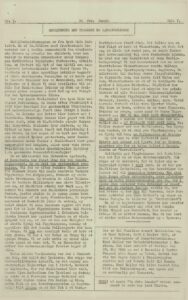
Fremstillingen af dansk ondskab er falsk. Af Casper Bauerfeld Krogh (Politiken.dk/Kronik, 4. december 2015). Om filmen “Under sandet” og minerydningen af den jyske vestkyst.
“Medlidenhed med Tyskerne er Landsforræderi” (DeFrieDanske, nr. 5). Blad frem til siden.
Illegal blads holdning til “flygtningene, der strømmer ind over vor Grænser, lusede, lsede, sultne, syge … Men vi må Ikke have medlidnhed. Thi det er .. at forråde voret eget land… Den hjælp vi yder … er en forlængelse af krigen…”
“Vi har lært at skelne mellem Medmeneske og – Tyskere”
Se på Socialistisk Bibliotek:
- Linkboxen: Besættelsen 1940-45 – og modstanden
- Linkboxen: Flygtninge 1943-1949, inkl. om minerydning og “tyskerpiger”.
21. marts 1949
Filosoffen Slavoj Žižek fødes i Lubjana, Jugoslavien (nu Slovenien).
Se:
- Žižek , Slavoj (Leksikon.org)
- Slavoj Žižek (Wikipedia.org)
- Slavoj Žižek (Information.dk). Artikler af Slavoj Žižek online.
- International Journal of Žižek Studies (site). “An online, peer-reviewed academic journal devoted to investigating, elaborating, and critiquing the work of Slavoj Žižek.”
Da Jordan Peterson mødte Karl Marx (Solidaritet.dk, 28. april 2019). “Mathias Rølle har set duellen mellem de to tænkere, og anmelder her ‘kampen’ for Solidaritet.” Se også Katalysator #9: A battle of giants? Zizek vs Peterson (Solidaritet.dk 3. maj 2019, 67 min.).
Žižek, en häst utan ryttare. Av Ludvig Sunnemark (Röda Rummet, 21. april 2023). “Få samtida filosofers ansikten är så kända som Slavoj Žižek. Men bakom de yviga
gesterna, de karaktäristiska sniffande lätena och de spektakulära, ibland skandalösa,
kommentarerna till politiska frågor döljer sig ett lika egensinnigt som viktigt bidrag till
den politiska teorin.”
Venstrefløjens hestebremse fylder rundt. Af Mathias Rølle (Solidaritet.dk, 21. marts 2019). “Hvis Žižeks bøger over de senere år er blevet mere filosofiske, er hans offentlige tilstedeværelse i medierne til gengæld blevet mere polemisk og provokatorisk.”
Žižek’s left-wing case for christian atheism. By Matt McManus (Jacobin, May 25, 2024). Review of Slavoj Žižek, Christian Atheism: How to Be a Real Materialist (Bloomsbury, 2024, 312 p.). “In his new book, Slavoj Žižek advances a provocative understanding of Christianity as a progressive, secularizing force. It’s classic Žižek — by turns brilliant and infuriating.”
In defense of Slavoj Žižek. By Conrad Hamilton and Matt McManus (Jacobin, June 11, 2021). “Slavoj Zizek has made some serious missteps in recent years — but he remains an important theorist for the Left in our postmodern, neoliberal era.”
The fool and the madman. By Sam Miller and Harrison Fluss (Jacobin, April 20, 2019). “Last night, Jordan Peterson spouted nonsense about Marxism. And Slavoj Žižek reminded us of how deep into liberal pessimism he’s fallen.”
Žižek: Fortress Europe’s staunch defender on the left. By Esben Bogh Sorensen (Roarmag.org, November 29, 2015). Med links til Slavoj Zizek: In the wake of Paris attacks the left must embrace its radical Western roots (In These Times, November 16, 2015) + The Non-Existence of Norway (London Review of Books, 9 September 2015).
Is democracy the enemy? A reply to Zizek. By Louis Proyect (The Unrepentant Marxist, October 31, 2011). “Although the content of Slavoj Žižek’s blog post in the London Review (Democracy is the enemy) is not so nearly as bad as the title, it still betrays the same kind of misunderstanding of the relationship between democracy and socialism …”
A right-wing rant against British youth from Slavoj Žižek. By Stefan Steinberg (World Socialist Web Site, 27 August 2011). See also Slavoj Žižek: Shoplifters of the World Unite (London Review of Books, 19 August 2011)
The power of nonsense. By Alan Johnson (Jacobin, June 14, 2011). “Žižek’s philosophy is, to be blunt, a species of linksfaschismus. This is true of its murderous hostility to democracy, its utter disdain for the ‘stupid’ pleasures of bourgeois life, its valorization of will, ruthlessness, terror and dictatorship, and its belief in the salvific nature of self-sacrificial death.”
Zizek in Manhattan: an intellectual charlatan masquerading as ‘left’. By Bill Van Auken and Adam Haig (World Socialist Web Site, 12 November 2010). “That a charlatan and anti-Marxist like Zizek is promoted as an important philosopher by a whole range of ex-radicals is a troubling symptom of the deep intellectual and political disorientation of this social milieu.”
Slavoj Žižek, an idealist Trojan horse. By Simon Hardy (League for the Fifth International, 28 October 2010; online at Internet Archive). “However, despite his popularity on the left, from a Marxist point of view it is necessary to conclude that whatever Žižek’s benefits for the intellectual left, ultimately he adds more confusion than clarity.” See also a response from a reader from Slovenia: In defence of Zizek (Ibid., 3 January 2011).
A philosopher in thrall to the ”end time”. By Phil Sharpe (A World to Win, 23 September 2010). Review of Slavoj Zizek, Living in the End Times (Verso, 2010). “What is apparent, however, is Zizek’s increasing distance from the process of revolution and its aftermath.”
Slavoj Zizek’s failed encounter with Leninism: ‘The bread of justice must be baked by the people’. By Paul Kellogg (Links: International Journal of Socialist Renewal, February 2010). “… Žižek’s treatment of Lenin is completely decontextualised, as if history and economics did not matter. And when he does briefly provide a context, he gets it completely wrong. The Lenin he is reviving is the Lenin that is least relevant to contemporary conditions.”
Slavoj Zizek’s Ideas need to link with reality. By Alex Callinicos (Socialist Worker, Issue 2142, 14 March 2009). “… where Zizek gets shifty is over the question of Stalinism. Pressed about the relationship between the idea of communism and what is sometimes called ‘historical Communism’, he ducks and dives. Fortunately, he doesn’t repeat some of the really silly things he has said on this subject in the past.”
The only hope of the revolution is the crowd: The limits of Žižek’s Leninism (pdf). By
Paul Kellogg (International Journal of Žižek Studies, Vol.2, No.2, 2008, p.). “For Žižek, the hope of revolution is to be found in a gesture of individual violence directed at ‘The Other’. Better we stick with Lenin, for whom the only ‘hope’ of the revolution is the ‘crowd’.”
Shedding some light on Lenin. By Chris Harman (International Socialism, Issue 116, Autumn 2007). Review of Sebastian Budgen, Stathis Kouvelakis and Slavoj Zizek (eds), Lenin Reloaded: Towards a Politics of Truth (Duke University, 2007). “Far too many of the pieces overdose on academic language that obscures what the authors might be trying to say, and on occasions degenerates into gibberish.”
A cyberspace Lenin: why not? By Slavoj Zizek (International Socialism, Issue 95, Summer 2002)
4. april 1949
Grundlæggelsen af “forsvarsalliancen” NATO.
Se:
NATO (Leksikon.org)
Se på Socialistisk Bibliotek:
Linkboxen: NATO – 60 års trussel
18. april 1949
Republikken Irland proklameres.
Se:
Irland (Leksikon.org)
Maj 1949
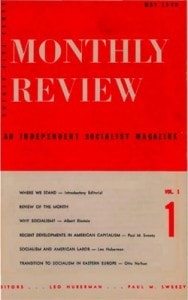
Første nummer af det internationalt indflydelsesrige amerikanske marxistiske tidsskrift Monthly Review udkommer, “An independent socialist magazine”.
Grundlæggeren Paul M. Sweezy udgav (sammen med Paul A. Baran i 1966 bogen Monopoly Capital. (Svensk udgave online på Marxistarkiv.se).
Links:
- Monthly Review (site). With About MR, index and many articles online.
- Monthly Review (Wikipedia.org)
- MR Online (site). Formerly MRZine.
After MRZine. By Yoshie Furuhashi (MRZine, December 31, 2016). “Today MRZine comes to an end, after over a decade’s run”. See also Louis Proyect: MRZine: goodbye and good riddance (The Unrepentant Marxist, January 2, 2017). “After a decade of pumping out propaganda for the Islamic Republic of Iran and the Baathist dictatorship in Syria, MRZine is no more.”
Introduction: A socialist magazine in the American century. By Christopher Phelps (Monthly Review, Vol.51, No.1, May 1999). “For a magazine of the American left, fifty years is a veritable eternity. Simply to reach the age is a stunning achievement.”
The Monthly Review School. By Sam Williams (A Critique of Crisis Theory, March 2010). “Though it has never been organized in the form of a political party, it is held together by certain common ideas in both economics and politics.”
Se også linksamlingerne om redaktørerne på Socialistisk Bibliotek:
- Personlisten: Paul M. Sweezy, redaktør 1949-2004.
- Tidslinjen: 21. august 1913, om Harry Magdoff, redaktør 1969-2006.
- Tidslinjen: 9 december 1920, om Harry Braverman, forlagsredaktør.
8. juni 1949
George Orwell udgiver romanen “1984”.
Se:
- 1984 (roman) (Wikipedia.dk)
George Orwell lånte plot af russisk kollega. Af Nils Thorsen (Politiken, 13. juni 2009). “Romanen ‘1984’, som i disse dage fejrer 60-års jubilæum, er ikke lige så original som de fleste af os tror.”
George Orwell – socialist, anarkist eller hvad…?: Om George Orwells politiske udvikling. Af Claus B. Storgaard (Handelshøjskolen i Århus, 1979). Se afsnit 4.9-10 om Nineteen Eighty-Four.
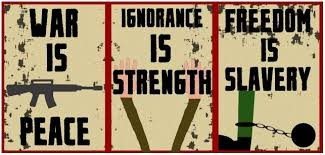
– Krig er fred
– Uvidenhed er styrke
– Frihed er slaveri
In English:
- Nineteen Eighty-Four (Wikipedia.org)
Nineteen Eighty-Four and all that (Socialist Review, Issue 454, February 2020). “Seventy years after his death, George Orwell has been canonised by the literary establishment as a liberal critic of totalitarianism. John Newsinger argues that his life and his work show him to be a harsh a critic of capitalism, and a staunch supporter of the struggles of the ‘common people’.”
The secrets of Nineteen Eighty-Four . By James Preece (International Socialism, Issue 163, Summer 2019, p.133-152). “This article attempts to address these critiques from the left by closely examining the context of Nineteen Eighty-Four and Orwell’s late political beliefs, before delving into a radical textual study of the novel itself to make clear the true significance of this important work.”
A comment: Revisiting George Orwell’s Nineteen Eighty-Four in 2010. By Richard Mynick (World Socialist Web Site, 12 June 2010). “Yet Nineteen Eighty-Four was no endorsement of the West. It posits only an unaccountable elite that rules in its own interests and maintains power by taking state-run mind control to its logical extreme.” See also: Letters on ‘Revisiting George Orwell’s Nineteen Eighty-Four in 2010’ (19 June 2010).
Orwell’s Animal Farm and Nineteen Eighty-Four: Critiques of Stalinism ‘from the left’? By Alex Miller (Links: International Journal of Socialist Renewal, April 2008). “This essay is the result of a re-reading of George Orwell’s two most famous novels. Both Animal Farm and Nineteen Eighty-Four have acquired the status of textbooks, and are routinely used in schools to demonstrate to children the inherent dangers of social revolution. It is time for a reappraisal.”
Orwell Centenary: From 2003 to 1984 (Socialist Review, Issue 276, July/August 2003). “George Orwell was one of the most influential writers of the 20th century. On the hundredth anniversary of his birth we examine the controversy around his work and his legacy for today. Andrew Stone assesses the relevance of Orwell’s most famous novel, Nineteen Eighty-Four.”
George Orwell: Imagining the totalitarians. By Chris Hickey (Solidarity, 3/34, 10 July 2003). “1984 is a dark book. It lacks the clear alternative of Animal Farm’s revolution. Orwell said that he ‘ballsed it up rather’ writing it while suffering from his tuberculosis. Yet I have always thought it was an amazing, if somewhat uneven, novel and not as dark as I first thought.”
Re-reading ’Nineteen Eighty-Four’ in 1984. By Paul O’Flinn (International Socialism, Issue 23, Spring 1984, p.76-98). “What I’d like to do in the rest of the article is to look first of all at the material Orwell supplies in Nineteen Eighty-Four and then at some of the ways that material has been commandeered by Right and Left since 1949. In so doing I hope to arrive at an answer to the main question that the text raises for Marxists today, namely, what do we do with it?”
Animal Farm, 1984 and socialist revolution. Chapter in Paul O’Flinn: Them and us in literature (London, Pluto Press, 1975, p.14-20; online at Marxist Internet Archive). “So what are we to make of this socialist who for the past generation has supplied the Right with a whole armoury of blunt instruments with which to attack the Left? More important, what’s useful in Orwell’s ideas and Orwell’s warnings for the present generation of socialists?”
1984 – the mysticism of cruelty. In Isaac Deutscher: Heretics and Renegades and Other Essays (Hamish and Hamilton, 1955; online at Marxist Internet Archive). “1984 is a document of dark disillusionment not only with Stalinism but with every form and shade of socialism. It is a cry from the abyss of despair. What plunged Orwell into that abyss?”
1984 – Utopia reversed: Orwell’s penetrating examination of totalitarian society. By Irwing Howe (New International, Vol.16, No.6, November-December 1950; online at Marxist Internet Archive). “That George Orwell’s 1984 is a work of major significance, as a political document if not as a novel, and that it is probably the best delineation of totalitarian society we have, is by now clear to anyone who has read the book.”
Se på Socialistisk Bibliotek:
Personlisten: Venstrefløjens George Orwell
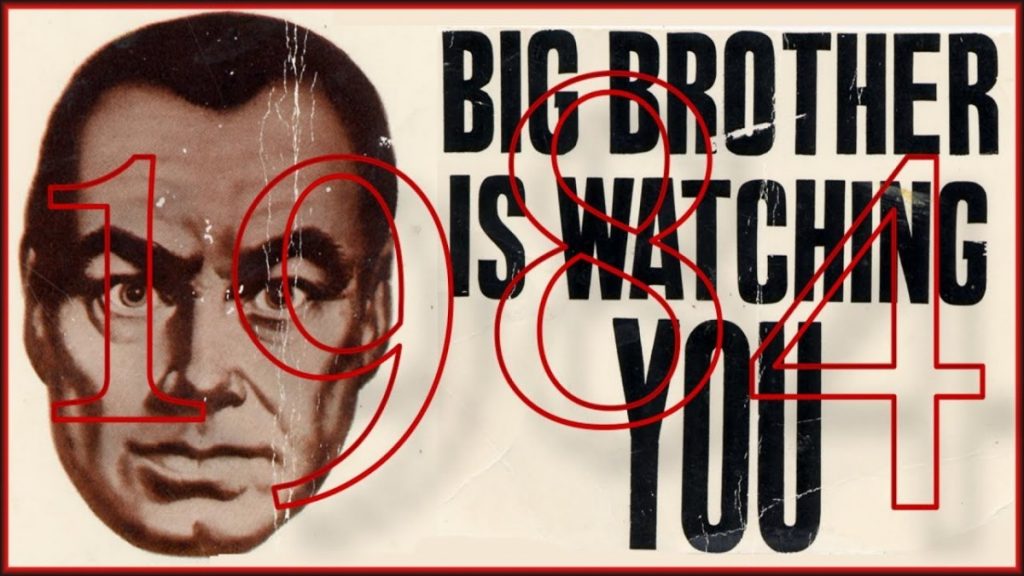
29. august 1949
USSR affyrer deres første A-bombe i testområdet Semipalatinsk i Kazakhstan, bryder USAs kernevåbenmonopol og sætter “terrorbalancen”.
Se:
Kernevåben (udvikling og våbenkapløb) (Denstoredanske.dk)
16.-24. september 1949
Rajk-processen i Ungarn som den første af Stalins udrensningsprocesser i folkedemokratierne af potentielle “nationale kommunister”.
Se:
László Rajk (Wikipedia.org)
1. oktober 1949
Kinesiske Folkerepublik grundlægges. “1/3 af Jordens overflade er kommunistisk”.
Se på Socialistisk Bibliotek:
- Emneoversigten: Kina / China
- Linkboxen: Folkerepublikken Kina, 1949-
- Tidslinjen: 12. april 1927, om KKPs nederlag.
7. oktober 1949
DDR grundlægges. “At lære af Sovjetunionen vil sige at lære at sejre” (if. W. Ulbricht).
Se:
Afsnit: Den Tyske Demokratiske Republik (DDR) (1945-90), – i: Tyskland (Leksikon.org) + Berlinproblemet + Walter Ulbricht
Se også:
How Germany became divided after WWII: Stalin didn’t do it (The Unrepentant Marxist, June 6, 2010). Kai Bird’s review article from The Nation (December 16, 1996)
Se på Socialistisk Bibliotek:
Linkboxen: Berlinmurens fald, om dens historie og stalinismens sammenbrud.
16. oktober 1949
Afslutningen på den græske borgerkrig, 1946-1949.
Se:
- Den græske borgerkrig (Wikipedia.dk)
- Greek Civil War (Wikipedia.org)
- Greek Resistance (Wikipedia.org)
- Theme: The Greek Civil War, 1946-1949 (Marxists Internet Archive; Subject Archive)
Struggle and suffering: The 1946-49 Greek Civil War. By Doug Enaa Greene (Links: International Journal of Socialist Renewal, July 17, 2015). With video presentation of the talk (1:09:23 min.). “The loss by the Communists can be traced back to a number of factors: poor political decisions, indecisiveness in recognising their enemies, failure to take the initiative, military mistakes during the civil war and the fact that they were decisively outgunned by the United States who aided the royalists.”
Greek Civil War: The 1944-45 Dekemvriana and the lessons for today. By Nina Christou (In Defence of Marxism, 17 June 2015). “… due to the mistakes of the leaders of the Communist Party and the Stalinist bureaucracy, the Revolutionary movement that defeated the Nazis was brutally crushed and resulted in the darkest years of Greek history – the Greek civil war.”
The Greek Revolution and Civil War: 70 years since the Battle of Athens. Part One. By A. Rodriguez (In Defence of Marxism, 4 February 2015) + Part 2 (3 March 2015). “It is time to reflect on the events of the 1940s and draw the lessons for today.”
Gerillakriget i Grekland 1940-1945: Kapetan Aris (pdf) (Dejavu Publicerings, 2010, 352 s.) (Marxistarkiv.se). “Två recensioner av en verkligt läsvärd bok.”
British intervention and the Greek Revolution. By John Newsinger (Socialist History Society, London, 2002; online at Reds/Die Roten). “Even before the final surrender of Nazi Germany, British troops were engaged in a bloody attempt at suppressing the resistance movement in Greece, the Communist-led National Liberation Front.”
Greece: War and Civil War (Workers Solidarity Movement, 1994; online at Libcom.org). “Text of a talk by Andrew Flood on the activities of the Greek Communist Party before and during the Second World War and its reactionary effect on the resistance movement as well as the support of the allies for authoritarianism in Greece.”
Theme: Trotskyism and Stalinism in Greece (Revolutionary History, Vol.3, No.3, Spring 1991, p.1-42). “The intention of this collection is to uncover a dark period in the history of the Greek labour movement, in which the Trotskyists provided the greatest tally of victims of Stalinist murder and repression outside the borders of the Soviet Union itself.”
The massacre of the Internationalist Communists in Greece, December 1944. Extract from A. Stinas, Memoirs: A Revolutionary in 20th Century Greece (Revolutionary History, November 2004; online at Marxists Internet Archive). “Revolutionary History wishes to commemorate, on its 60th anniversary, the December 1944 slaughter of Trotskyists … by the Stalinists in Greece. We do so by publishing … this extract from the memoirs of Agis Stinas, one of the leading members of the Trotskyist movement in Greece.” See Alison Peat’s review of Agis Stina’s book (Revolutionary History, Vol.3, No.1, Summer 1990).
Interview with General Markos Vafiades, former leader of ELAS (1983). From the Greek Trotskyist paper Socialist Change, 1983: “The recent return from exile of General Markos Vafiades has revived memories of the role of the Communist Party in the Greek revolution and added new historical information of this brutal betrayal of the Greek working class at the end of World War II.” In Andy Blunden: Stalinism: Its origins & future (1993; online at Internet Archive).
The Kapetanios (pdf). By George Catephores (New Left Review, Issue 79, May-June 1973, p.50-59). Review of Dominique Eudes, The Kapetanios: Partisans and Civil War in Greece 1943-1949 (NLB, 1972, 381 p.). Only extract online
Kontrarevolution – myt och verklighet i Grekland (pdf). Av Todd Gitlin (I David Horowitz, red.: Kontrarevolution: Västmakternas politik gentemot sociala revolutioner från 1917 till Vietnam. Stockholm, Tidens Förlag, 1969; online på Marxistarkiv.se, 23 s.). “Grekland var 1940-talets Vietnam inte bara i retorisk mening. Det utgjorde den anti-kommunistiska
‘containment’-politikens första större slagfält.”
See also:
The crimes of the Nazis in Greece, Part 1-3. By Katerina Selin (World Socialist Web Site, September 11-14, 2015). “Well over 100,000 partisans and civilians fell victim to the German occupation between 1941 and 1944. Around 90 percent of the Jewish population were murdered, while tens of thousands of Greeks suffered a horrific death by starvation, or froze because fuel and foodstuffs were confiscated.”
2. december 1949
Jan Toftlund, social visesanger fødes i København. (Dør 5. juli 1990 i Refsvindinge på Fyn).
Jeg fik et chok, da jeg så den dér vildmand té sig som en tosse oppe på scenen. Han råbte, skreg og drak elefantbajere. Hvad er det for en forfærdelig mand, tænkte Lasse Helner, der ikke var vant til sådan en opførsel ude på bondelandet, som han selv omtaler Vestfyn (kilde: Fyens.dk: Den humleglade ordsmed, interview om Jan Toftlund).
Se:
Jan Toftlund (Denstoredanske.dk). Kortere intro.
Jan Toftlund – “Toften” til minde! (Facebook – Offentlig gruppe)
Jan Toftlund (Last.fm)
Jan Toftlund (Jantoftlund.dk). “Jan Toftlunds officielle hjemmeside.”
Jan Toftlund – hyldes space (MySpace.com)
Litteratur:
Stor bog om Danmarks Dylan – Jan Toftlund. Af Bjarne Nielsen (Arbejderen.dk, 19. marts 2013). Anmeldelse af Justin Hummerston og Morten Ehrhorn (red): Jan Toftlund – flagermussang og sjælemedicin (Forlaget Ehrhorn-Hummerston, 2013, 600 sider)
Bagsidesanger : en bog om Jan Toftlund og hans tid. Af Espen Strunk. ((Politisk Revy/Gaffa, 2013, 229 sider, Med bibliografi og diskografi)-
Jan Toftlund: Første Maj (Youtube, 3:45)
21. december 1949
Den panafrikanske progressive nationalist, præsident for Burkino Faso 1983-87, Thomas Sankara fødes (Henrettes efter et kup styret af fransk imperialisme 15. oktober 1987, se denne).
















